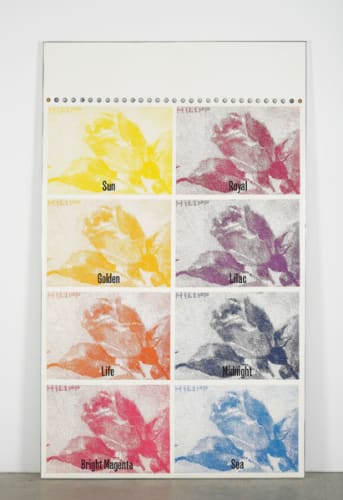KP Brehmer Druckmuster Ideale Rose, 1969 Mixed media technique on PVC sheet signed and dated by KP Brehmer on the back 201 x 121 x 2 cm 79 x 48 x 1 inches Unique MDF plinth 5 x 100 x 141 cm / 2 x 39 x 56 inches A major figure of the German Pop Art Initiative Capitalist Realism, Brehmer worked alongside artists such as Sigmar Polke, Gerhard Richter, Hans Haake and Marcel Brood¬hathaers. As part of the German Neo Avant garde, Brehmer’s critical occupation with quotidian forms of image production resulted in his conception of art as a “sensorial instrument for emancipatory awareness”. Inhabiting a postwar Germany dealing with a process of denazification, the need to deconstruct the relationship between the individual and the state as mediated through the mass circulation of images, was a driving force in Brehmer’s thinking. His concerns as an artist return him again and again to the act of looking as a position already conditioned, already implicated. But it is important to remember that his stance was far from a pessimistic one. In fact, he surmised his motives for making with the words, ‘perception is action’. Produced with a deliberately objective aesthetic, Brehmer’s artworks lay out a situation for the viewer and ask him or her to make a choice. The idea of interactivity is central here and is exemplified by the work Druckmuster Ideale Rose (1969). The work presents an image of a rose printed in a series of different colours. Each colour is labeled with its evocative given name. Laying bare the apparatus of capitalist economies of knowledge, the work asks the viewer to participate thoughtfully in projecting their own ideal from the constituent parts. It is in this sense that his works function as manuals for looking. In opposition to the creeping pressures of capitalism, which in the early 70’s were being radically transformed, his subtle interferences with familiar images unmasked the mechanisms of their becoming so that the viewer might rebuild them again on his or her own terms.

